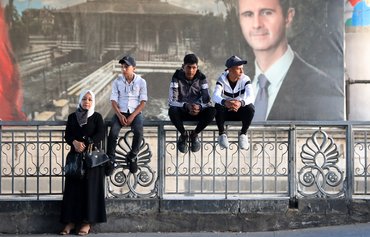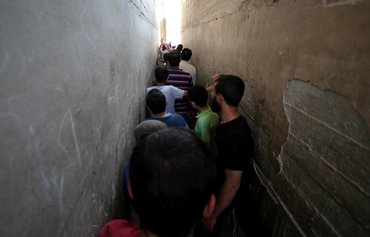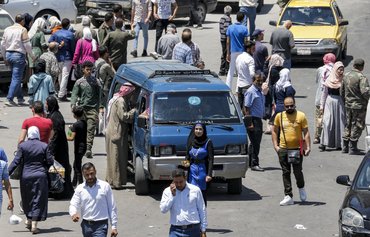CAIRO -- High inflation, soaring foreign debt and lack of purchasing power of Syrian citizens warn of the imminent collapse of the Syrian economy, observers say.
They attributed the reason to the Syrian government's inability to manage the crisis and the inconsistency of foreign aid, notably from Russia, an ally of the regime of Syrian president Bashar al-Assad.
Observers have warned of the collapse of the social order due to growing inequalities between the majority of the population and those close to the regime.
Syrian journalist Khaled al-Masri, who works in Cairo but recently returned to visit his family in Syria after an absence of a year and a half, told Al-Mashareq he cannot describe the feeling he had when he arrived in Damascus.
![Syrian citizens wait for hours for public buses, most of which have stopped operating from the scarcity and high prices of fuel, in this video grab, posted December 13. [Ninar FM]](/cnmi_am/images/2023/01/31/40385-syria_econ_2-600_384.jpg)
Syrian citizens wait for hours for public buses, most of which have stopped operating from the scarcity and high prices of fuel, in this video grab, posted December 13. [Ninar FM]
![In this video grab, Syrians have been resorting to coal stoves that don't require electricity to heat or cook, in response to a surge in petroleum product prices. [Sham Network]](/cnmi_am/images/2023/01/31/40384-syria_econ_1-600_384.jpg)
In this video grab, Syrians have been resorting to coal stoves that don't require electricity to heat or cook, in response to a surge in petroleum product prices. [Sham Network]
"Everything has changed suddenly, and a cloud of sadness and depression has descended over all residents of Damascus because of the prevailing economic conditions," he said.
Daily struggles
Long lines of cars at gas stations and bakeries "have become a daily fixture", al-Masri said.
"If, and when, there is electricity, it is only on for an hour or two at the most, and of course the telecommunications network is not operating at its usual efficiency because most of the towers do not receive electricity," he said.
About half of the shops in Damascus have closed their doors, he said, while in the restaurants that are still operating, "the prices are staggeringly high".
He said he learned from his father who works in manufacturing industrial equipment that most factories have had to shut down from the unavailability of raw materials or their high prices if they can even find them, as well as from their lack of purchasing power.
The areas under regime control, especially Damascus, perhaps suffer the most because they have a higher cost of living than do rural or remote areas, coupled with a dearth of job opportunities, he said.
Even Syrians living abroad struggle to send remittances in hard currencies to their families, he said, "as the remittances are received in Syrian pounds, and at half the actual exchange rate, which means they lose almost half of their value".
No purchasing power
Numerous reports warn of the catastrophic Syrian economy, Ain Shams University economist Fakhreddin Awadallah told Al-Mashareq.
"The exchange rate of the US dollar has doubled in one year, and the trade deficit has ballooned to $3.5 billion, while the price of gasoline, the lifeblood of many vital sectors, has increased by 44% in three months," he said.
This will negatively impact the education and healthcare sectors, he said, among other vital sectors of the economy.
According to Awadallah, the coming period will be the hardest in view of the lack of purchasing power of citizens, especially in major cities, where there are more employees than jobs and where prices have increased by 100% or more.
Normal daily life has become a "luxury that every Syrian citizen dreams of", he said, adding that the average family currently needs about 4 million SYP per month to meet its daily needs.
Meanwhile, public sector wages do not exceed 300,000 SYP per month, and the figure is much lower in the private sector, he added.
In early January, the Syrian pound hit an all-time low of 7,000 SYP to the dollar on the black market before rebounding to around 6,000. This amount is still only slightly over half of its value a year ago.
"The tragic situation of the Syrian economy clearly portends a major catastrophe that will happen soon, and its main victims will be the Syrian people," said Syrian economist Mahmoud Mustafa, a lecturer at Damascus University.
The government has not taken any urgent measures to remedy the situation and instead relies on foreign aid, which has declined considerably, especially aid from Russia, Mustafa said.
Russia aid
Between 2016 and 2021, Russian aid to Syria declined despite the needs of Syrians increasing over the same period, researcher Jonathan Robinson wrote for the Atlantic Council in June 2021.
Russian aid to Syria is shallow and inconsistent and lacks commitment, he said.
"It is clear from Russia's own data that their aid efforts do not have the best interest of the Syrian people in mind and operate well below the standard of the UN [United Nations]-led response to the country," he added.
Russia's inconsistent aid to Syria was made worse because of its war on Ukraine, where it has focused the majority of its resources.
Moreover, in early July, Moscow vetoed an extension for the last UN aid mission in Syria for another year. The mission started in 2014 and expired last July.
Foreign officials and international aid workers had implored Russia to approve a one-year extension for the humanitarian corridor -- the last UN aid route into Syria -- which leads from the Bab al-Hawa crossing at the Turkish border into northwest Syria, the New York Times reported.
But with its veto, Moscow clung to its long-held claim that the route violated Syrian sovereignty -- and that it should be up to al-Assad to decide how foreign support is distributed, said the report.
Even the predatory actions of Iran's Islamic Revolutionary Guard Corps (IRGC) and its proxies will have harmful consequences for Syria's economy, Syrian analysts said.
Through the IRGC, the Iranian regime has sought to milk Syria's economy and has attempted to establish a foothold in strategic parts of the country by exploiting a dubious set of Syrian property laws, they said.
These actions aim to funnel revenue to the Islamic Republic and expand its influence in Syria, they added, noting that this trend harms the Syrian people, who are already suffering the consequences of war.
"The deterioration of the situation in this manner threatens an explosion of the social order due to life pressures on ordinary citizens, who are resorting to any means to survive day after day," Mustafa said.
A small class of Syrians appear to be unaffected by the current situation, Mustafa said, adding that they appear to be those who are "close to the regime and who run the Captagon trade, the currency black market and smuggling activities".

![Syrians stand in long queues in front of bakeries, after the government lifted the subsidies on bread, in 2021. [Syria TV]](/cnmi_am/images/2023/01/31/40386-syria_econ_3-600_384.jpg)






